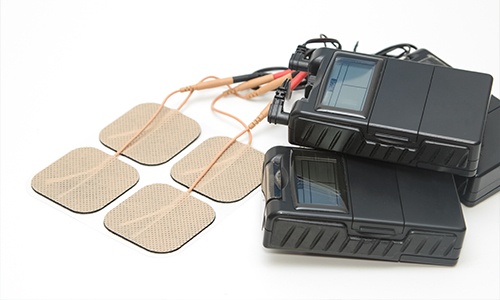
TMJ / TMD Therapy – Braintree, MA
Lasting Relief For Jaw & Head Pain
Do you constantly experience pain and stiffness in your jaw? Are headaches an everyday thing for you? Have other doctors not been able to help you with these problems? If so, they could be caused by issues with your TMJ, or temporomandibular joint. This is your jaw joint, and problems here (referred to as TMJ disorders or TMDs) can lead to chronic pain throughout the face, head, and neck. Thankfully, our dentist can diagnose and treat the most common causes of TMDs using proven and conservative therapies. Give us a call today to learn more and start getting the relief you need!

Why Choose Pinnacle Dental for TMJ / TMD Therapy?
- Dentist with More than 20 Years of Combined Experience
- Able to Stop Chronic Migraines
- Experience Immediate Relief with the TENS Machine
Diagnosis & Treatment

The TMJ is made up of a complex system of bones, muscles, ligaments, and nerves, and any imbalance, strain, or tension can easily turn into pain that radiates throughout the body. To diagnose a TMD, we’ll take X-rays of the joint and perform a series of mobility tests so that we can determine the root cause of the problem. Once this is done, our dentist can use one or more of the following treatments to restore function and stop any discomfort.
Equilibration / Occlusal Adjustments

A TMD can be brought on by a misaligned bite that puts uneven pressure on the joint. To fix this, we can scan the bite to find the particular areas where there is too much or not enough contact between the teeth, and then we can build up chosen teeth or slightly reshape them to create a nice, balanced bite. At this point, the joint should be able to relax and heal on its own.
Occlusal Splints

These are therapeutic mouthguards only worn to bed, and they work by gently shifting the lower jaw forward in order to relieve any tension in the muscles and ligaments. They also prevent unconscious teeth grinding during sleep, another common source of TMJ issues. After a patient has worn one consistently for a few weeks or months, the TMJ will adjust to this new position, and the patient should be able to go about their day without any symptoms.
TENS Machine Treatment

TMJ Therapy FAQs
Most people are not even aware of their temporomandibular joints until a dentist points them out to patients experiencing jaw pain. However, if you start to notice chronic jaw pain, you’re likely finding your daily life to be a lot more difficult than usual. If you have many questions on what you should do next or how TMJ therapy works, please read our frequently asked questions section below. If your question is not mentioned, don’t hesitate to give us a call directly.
What are the most common symptoms of TMJ disorder?
If you aren’t sure of what you’re experiencing is TMJ disorder, you’ll want to pay attention to the most common signs and symptoms so you can explain them to Dr. Zonghetti before you arrive. For example, if you notice pain or tenderness in your jaw, pain in either of your jaw joints, or aching pain in or around your ear, it’s likely due to inflammation of your jaw’s joints. Furthermore, if you find it difficult to chew, notice pain while chewing, or notice your jaw locking in place, get to our office as soon as you can for therapy.
Are there home remedies for TMJ disorder?
While we encourage you to get to our office as soon as possible, there are ways to mitigate discomfort before you do. Start by applying moist heat to your face via a heat pack or hot water bottle wrapped in a warm moist towel. Stick to a soft diet, take NSAIDs (i.e. ibuprofen) to temporarily ease jaw pain, and perform slow, gentle exercises to massage your jaw.
What can happen if TMJ disorder goes untreated?
Not only will your symptoms not go away on their own, reducing your overall quality of life, but untreated TMJ can actually lead to tinnitus. This condition is characterized by ringing or buzzing in the ears and is often associated with hearing loss. Your hearing can actually become permanently damaged if the TMJ is left untreated. You’ll also experience pain in areas that you might not have previously, including the neck, upper back and shoulders.
How long does TMJ therapy last for?
Therapy length truly depends on which treatment you choose and how your jaw reacts to the treatment. For example, some treatments can provide immediate relief, such as the TENS machine. Alternatively, other treatments may take a few days before you start to notice the symptoms fade. Nearly all forms of treatment provide fast relief, which is why it’s so important that you get therapy now, rather than assume the symptoms will go away on their own.
Who should I see for TMJ Therapy?
Dentists are some of the best medical professionals you can see for TMJ therapy because they understand the complex movements the jaw is responsible for and they are trained to treat issues that affect your overall bite. However, the best dentist you can see for treatment is one that is experienced in neuromuscular dentistry, which Dr. Zonghetti has extensive training in.
